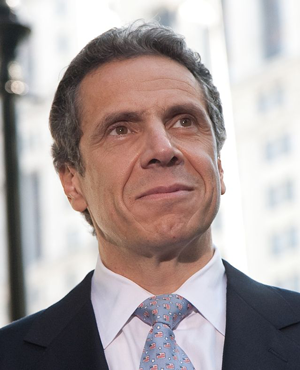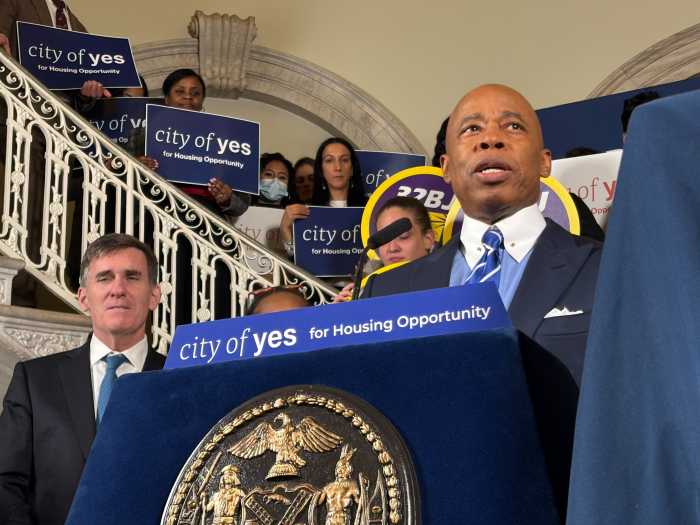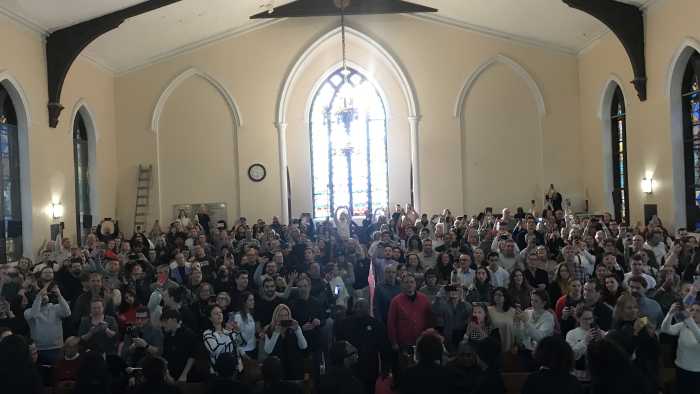
BY SARAH FERGUSON | Christmas came early for the fracktivist crowd. Governor Andrew Cuomo’s announcement last week that he would ban high-volume hydrofracking across New York State was a game-changing position that surprised even the most ardent opponents of this controversial process for extracting natural gas.
“We were stunned,” said Ramsay Adams, executive director of Catskill Mountainkeeper, which was one of the first groups in New York to raise the alarm about the dangers of fracking.
“Some people cried. I sort of screamed happy curse words,” said Adams, recalling the jubilant reaction in his office as he and his co-workers watched Cuomo and his commissioners lay out their rationale for a ban during a year-end cabinet meeting that was broadcast live.
“We had four press releases ready to go that day, depending on the outcome, and none of them predicted that,” added Adams, who had longtime frack foe Debra Winger on speakerphone when the decision came down.
Adams credited the myriad grassroots activists in New York who hammered on Cuomo and his predecessor, David Paterson, for the last eight years to renounce fracking, even when mainstream environmental groups said a ban would never happen. Many are now saying New York has set a benchmark for the rest of the country to follow, and potentially roll back fracking initiatives elsewhere.
“With the gas industry — losing is not in their playbook — and we just beat them,” Adams said. “So it shows it’s not a lost cause.”
Cuomo’s decision to impose an outright ban of H.V.H.F. is all the more striking given the recent moves by states like Maryland and Illinois to allow fracking to proceed. In fact, most people were expecting Cuomo to allow some limited trial of fracking in the Southern Tier, along the border of Pennsylvania, where some town boards have said they want the drilling.
That was the plan floated by the state Department of Environmental Conservation back in 2012. With Upstate polls still fairly split on the issue (though trending more negative of late), most figured Cuomo would play King Solomon and try to “split the baby.”
Instead, Cuomo decided to ban fracking across the state, deferring to the recommendations of Howard Zucker, the acting Department of Health commissioner, and Joseph Martens, the D.E.C. commissioner, who together concluded that the drilling technique’s overall risks outweighed its economic benefits.
Yet, while Zucker said he felt it would be “reckless” to proceed, he conceded that his department’s analysis — based on a two-year review of existing health and environmental studies — was still inclusive, largely because comprehensive, “longitudinal” studies of the impact of H.V.H.F. on people’s health, water and the environment have yet to be completed.
“The science isn’t there,” Zucker said. “But the cumulative concerns, based on the data and information I’ve read…give me reason to pause.”
No doubt there’s reason for New York to act with an abundance of caution. As D.E.C. Commissioner Martens noted, “New York is a very water-rich state.” Upstate rivers, reservoirs and aqueducts provide drinking water to more than 17 million people in New York, New Jersey and Pennsylvania. Other states don’t have such high concentrations of people living downstream.
But what also tipped the balance was the declining economic viability of fracking in New York. Martens said his department crunched the numbers and found that at least 63 percent of the Marcellus Shale would be off-limits to drilling because of restrictions around drinking water sources, as well as state parks and historical areas.
Martens also cited the growing list of towns that have enacted bans and moratoria on fracking. It turns out the so-called “Dryden Decision” (upheld by the Appellate Court in July), which confirmed the right of towns to pass zoning laws barring fracking under the state’s “home rule” provision, is more of a deal breaker than many thought.
Not only can towns vote to ban gas drilling, but those towns that did want gas drilling would have had to revise their zoning rules in order for it to proceed in their areas. As a result, gas companies were facing a hodgepodge of local restrictions across the state that would have been a headache for the industry and state regulators alike.
“It would have been fought town to town, pitting neighbor against neighbor,” said Adams.
And then there is the plunging price of oil, which has sent the nation’s shale market reeling. Given falling gas and oil prices, it’s unlikely banks would finance much drilling in New York right now anyway — especially when there’s plenty of less-regulated shale plays in Pennsylvania and beyond. (Indeed, some proponents of drilling say in some ways it makes sense for Cuomo to leave the gas “banked” in the ground, until prices go up again. )
Cuomo of course must have done calculating of his own based on the polls, which show Democrats overwhelming opposed to fracking.
“The people who are for fracking don’t like Cuomo anyway,” noted Adams. “So it was sort of a no-brainer for the governor. There was nowhere near the economic benefit first promised, and if he approved it, he risked a massive backlash from his base.”
Now, instead of a big protest rally that anti-fracking groups had been planning to hold in Albany on Jan. 7 to demand “Not One Well!” Catskill Mountainkeeper and scores of other environmental groups and activists will be gathering to do a victory dance on the steps of the capitol that day.
They also plan to launch a campaign to accelerate the transition to renewable energy across New York State.
“We can convert dairy farms in the Southern Tier to solar energy farms to help power New York City,” said Adams of Catskill Mountainkeeper, which just received a $1.87 million grant to promote solar energy through bulk buying of solar equipment.
Members of the Joint Landowners Coalition, a network of property owners who support gas drilling, are holding their own rally in Binghamton, N.Y., on Jan. 5 to denounce the ban and Governor Cuomo for “depriving people of their mineral rights.”




































